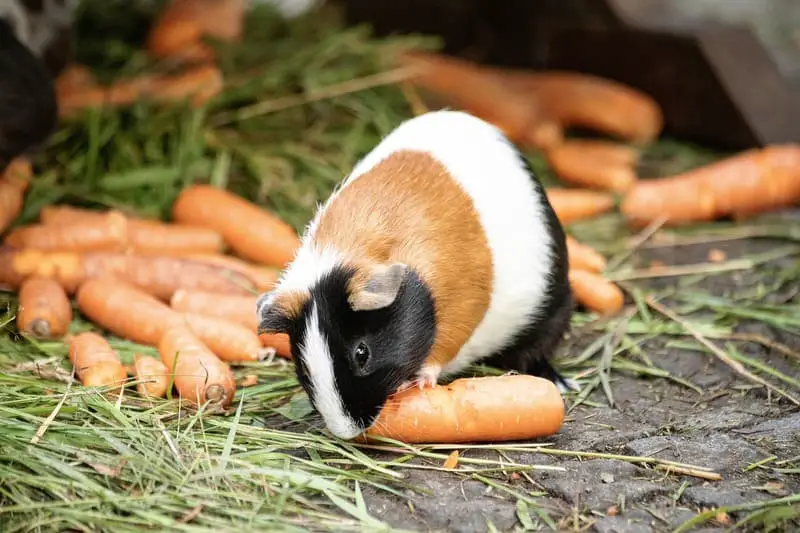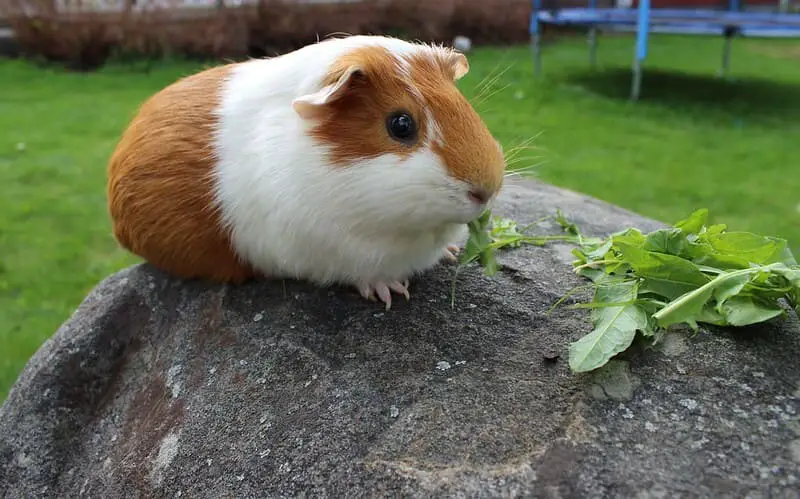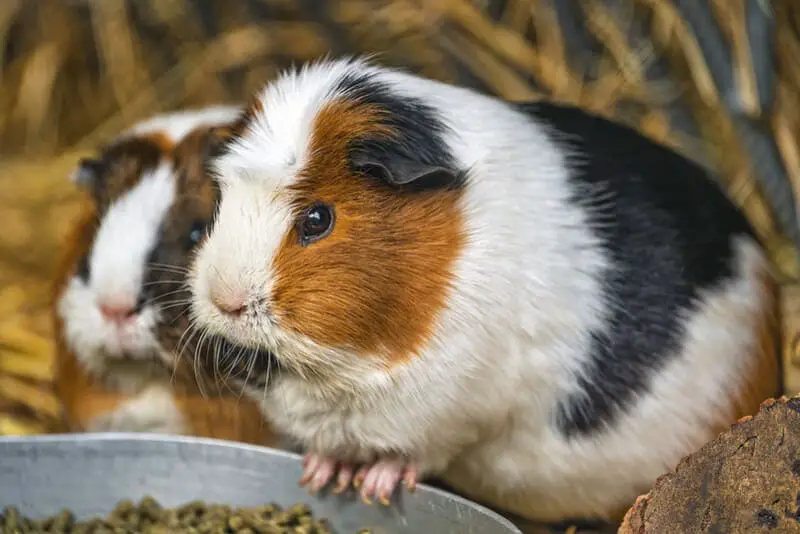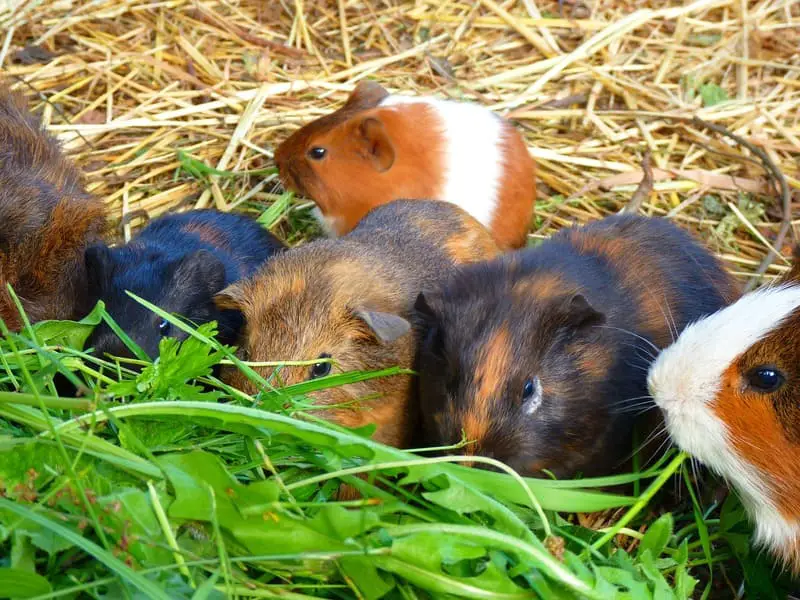Guinea pigs, also known as cavies, are delightful and popular small pets known for their friendly personalities and adorable appearances. Their nutritional needs are relatively simple, but providing them with a well-balanced diet is essential for their health and happiness. Understanding what guinea pigs like to eat, as well as what they should eat, is a crucial aspect of responsible pet ownership. In this comprehensive guide, we’ll explore the dietary preferences and requirements of guinea pigs, offering insights into their favorite foods, safe options, and tips for maintaining a healthy diet.

The Basics of Guinea Pig Nutrition
Before diving into the specifics of what guinea pigs like to eat, it’s important to understand their basic nutritional needs. Guinea pigs are herbivores, which means they primarily consume plant-based foods. Their diet should consist of:
- Fresh Hay: High-quality hay is the cornerstone of a guinea pig’s diet. It provides essential fiber, aids digestion, and helps keep their teeth healthy.
- Fresh Vegetables: A variety of fresh vegetables rich in vitamins and minerals should be part of their daily diet. These include leafy greens, bell peppers, and carrots.
- Fresh Water: Access to clean and fresh water is vital for guinea pigs to stay hydrated.
- Pellets: Guinea pig-specific pellets, when fed in moderation, provide additional nutrients and should complement the hay and vegetables.
Understanding the fundamentals of their diet allows us to explore the specific foods that guinea pigs enjoy and benefit from.
What Do Guinea Pigs Like To Eat?
Guinea pigs are known for their discerning taste, and they have specific preferences when it comes to their food. Here are some of the foods that guinea pigs like to eat:
1. Fresh Hay
Guinea pigs absolutely love fresh hay. It is a staple in their diet and should be available at all times. They enjoy munching on it throughout the day. Hay provides essential fiber, which helps maintain healthy digestion and dental health. There are various types of hay to choose from, including:
- Timothy Hay: This is the most commonly recommended hay for guinea pigs. It has the right balance of fiber and nutrients.
- Orchard Grass Hay: Guinea pigs enjoy orchard grass hay as a tasty alternative to timothy hay.
- Meadow Hay: Meadow hay is a good source of variety in their diet. It can be given occasionally to provide a change in flavor and texture.
2. Fresh Vegetables
Guinea pigs like to eat a variety of fresh vegetables, which provide them with essential vitamins and minerals. Some of their favorite vegetables include:
- Romaine Lettuce: Guinea pigs often enjoy the crisp and slightly bitter taste of romaine lettuce.
- Bell Peppers: These colorful vegetables are high in vitamin C and are typically a guinea pig favorite.
- Carrots: Guinea pigs love the sweetness and crunch of carrots. However, these should be fed in moderation due to their sugar content.
- Cucumbers: The watery and refreshing nature of cucumbers is a hit with guinea pigs.
- Cilantro and Parsley: These herbs add flavor and variety to their diet, and guinea pigs often find them quite appealing.
- Kale: While kale is nutritious, it should be fed in moderation due to its high calcium content.
3. Fruits
Guinea pigs have a sweet tooth, and they enjoy fruit treats in small quantities. Some of the fruits they like to eat include:
- Apples: Guinea pigs can’t resist the sweetness of apples, but be sure to remove the seeds and core before serving.
- Strawberries: These make for a tasty and vitamin-rich treat.
- Blueberries: Blueberries are a guinea pig favorite due to their delicious flavor and high antioxidant content.
- Melon: Watermelon and cantaloupe are refreshing choices that guinea pigs enjoy during hot weather.
- Pears: Like apples, pears are a sweet treat for guinea pigs, but be sure to remove the seeds.
4. Pellets
Guinea pig pellets are formulated to meet their dietary requirements and often contain a mixture of grains, vitamins, and minerals. While guinea pigs do enjoy the taste of pellets, it’s important to offer them in moderation. High-quality guinea pig pellets should be free of added sugars and artificial additives. Pellets should not be the primary source of nutrition and should complement a diet rich in hay and fresh vegetables.
5. Chew Toys and Wooden Blocks
While not traditional foods, guinea pigs love to chew on toys and wooden blocks. These provide mental stimulation and help keep their ever-growing teeth worn down.
6. Small, Safe Branches
Guinea pigs enjoy nibbling on small, safe branches from fruit trees such as apple or pear. Make sure the branches are pesticide-free and have been thoroughly cleaned and dried.
It’s important to remember that while guinea pigs may enjoy these foods, not all of them are equally nutritious or should be provided in large quantities. Maintaining a balanced diet is essential for their health and well-being.

Foods to Avoid
In addition to knowing what guinea pigs like to eat, it’s equally crucial to be aware of foods that should be avoided. Some foods can be harmful or toxic to guinea pigs, and it’s essential to steer clear of them. Here are some foods that should not be part of a guinea pig’s diet:
1. High-Sugar Fruits
While guinea pigs enjoy fruits, high-sugar options like grapes and bananas should be fed sparingly due to their potential to cause weight gain and digestive issues.
2. High-Calcium Vegetables
High-calcium vegetables, such as spinach and Swiss chard, should be offered in moderation. Excessive calcium can lead to kidney stones in guinea pigs.
3. High-Fat Foods
Fatty and oily foods, like nuts and seeds, should be avoided as they can lead to obesity and digestive problems.
4. Onions and Garlic
Onions and garlic can be harmful to guinea pigs and should never be included in their diet.
5. Processed Foods
Avoid offering processed or sugary foods like chocolate, candy, or processed snacks. These can harm your guinea pig’s health.
6. Dairy Products
Guinea pigs are lactose intolerant, so dairy products should not be given to them.
7. Human Food Scraps
Avoid feeding guinea pigs table scraps or leftovers from your meals. These can contain ingredients that are harmful to them.
8. Moldy or Spoiled Food
Only offer fresh, clean, and uncontaminated food to your guinea pig. Moldy or spoiled food can cause health problems.
9. Plants and Flowers from the Garden
Plants and flowers from the garden may be toxic to guinea pigs, so be cautious when introducing new items into their diet.
10. Avocado
Avocado is toxic to guinea pigs and should never be fed to them.

Tips for Feeding Guinea Pigs
Feeding guinea pigs correctly is not just about knowing what they like to eat and what to avoid. Here are some additional tips for providing a healthy and enjoyable dining experience for your furry friends:
1. Variety Is Key
Offer a variety of foods to prevent dietary boredom and ensure a broad spectrum of nutrients. Guinea pigs enjoy a diverse diet, so rotate their vegetable and fruit offerings.
2. Freshness Matters
Always provide fresh food and clean water. Guinea pigs are sensitive to the quality of their diet, and stale or spoiled food can lead to health issues.
3. Serve in Moderation
While guinea pigs may enjoy certain foods, it’s important to serve them in moderation. High-sugar and high-calcium foods should be limited, and treats should be occasional, not daily.
4. Wash Thoroughly
Wash all vegetables and fruits thoroughly before serving them to remove pesticides, residues, and dirt. Always peel and deseed fruits as needed.
5. Monitor Portions
Guinea pigs have specific dietary needs based on their age, weight, and activity level. Be mindful of portion sizes to prevent overfeeding and obesity.
6. Gradual Introductions
When introducing new foods to your guinea pig’s diet, do so gradually. This allows their digestive system to adjust and minimizes the risk of stomach upset.
7. Hydration Is Vital
Guinea pigs need access to clean, fresh water at all times. Make sure their water bottle is always filled, and check it daily.
8. Avoid Quick Diet Changes
Sudden dietary changes can cause digestive upset. If you need to change their diet, do so gradually by introducing small amounts of the new food while decreasing the old.
9. Special Care for Young and Pregnant Guinea Pigs
Young, pregnant, and nursing guinea pigs have specific nutritional requirements. Ensure they receive the necessary nutrients, including additional calcium for pregnant and nursing sows.

Balancing the Diet
Balancing a guinea pig’s diet is key to ensuring they receive the appropriate nutrients and maintain good health. Follow these guidelines to provide a well-rounded diet for your guinea pig:
1. Hay
Hay should make up the majority of your guinea pig’s diet. High-quality, fresh hay should be available at all times to promote healthy digestion and dental health.
2. Fresh Vegetables
Offer a variety of fresh vegetables daily to provide essential vitamins and minerals. Leafy greens like romaine lettuce, bell peppers, and carrots are popular choices.
3. Pellets
Guinea pig pellets should be fed in moderation. Opt for high-quality pellets free of added sugars and artificial additives. Pellets should complement the hay and fresh vegetables, not replace them.
4. Treats and Fruits
Treats, including fruits, should be given sparingly. They can be used for training, bonding, and as occasional rewards.
5. Fresh Water
Ensure your guinea pig has access to clean, fresh water at all times. Guinea pigs are prone to dehydration, so it’s essential to maintain their water supply.
6. Vitamin C
Guinea pigs require vitamin C in their diet because they cannot produce it themselves. Fresh vegetables high in vitamin C, such as bell peppers and parsley, can help meet this need. Alternatively, vitamin C supplements designed for guinea pigs can be added to their water, but it’s best to consult with a veterinarian before doing so.
7. Calcium
While guinea pigs need calcium, excessive amounts can lead to kidney stones. To prevent this, avoid feeding high-calcium vegetables and alfalfa hay (which is high in calcium) to adult guinea pigs.
Conclusion
Understanding what guinea pigs like to eat and how to provide a balanced diet is crucial for their health and well-being. Guinea pigs have discerning tastes, and they enjoy a range of foods, from fresh hay and vegetables to fruit treats. However, it’s equally important to be aware of foods that are harmful to them and to provide a diet that is rich in essential nutrients.
By offering a balanced diet, monitoring portion sizes, and ensuring that their food is fresh and clean, you can ensure your guinea pig enjoys a healthy and satisfying diet. A well-fed guinea pig is not only a happier pet but also a companion that can bring joy and affection to your life.
